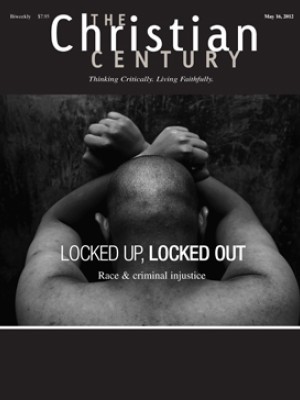Investment, not divestment: How to help the Palestinians

Many U.S. denominations have partner churches in the Holy Land. The Evangelical Lutheran Church in America, for example, has a strong commitment to “accompany” the Evangelical Lutheran Church in Jordan and the Holy Land.
Given the relationship that many American churches and American Christians have with Palestinian Christians, the challenge is how to properly engage the Israeli-Palestinian conflict. Should we take sides in the conflict by echoing the narrative of our suffering Palestinian brothers and sisters? Or does being faithful to the gospel call us to include Israeli suffering in the breadth of our concern? How do we acknowledge the complexity of the conflict and help Palestinians and Israelis move toward the day when they live at peace as neighbors?
Most mainline denominations have struggled with this challenge, and recently some have begun to find a creative response. At its 2011 Churchwide Assembly, the ELCA expressly rejected a plan for divestment from Israel and encouraged the various congregations, synods and church agencies to “consider making positive economic investments in those Palestinian projects and businesses that peacefully strengthen the economic and social fabric of Palestinian society.”
Read our latest issue or browse back issues.
Encouraging economic investment in Palestine is a positive, potentially transformative strategy, and it is to be preferred to the punitive options of encouraging divestment and boycotts of Israel or of companies doing business with Israel. Boycott and divestment are focused on tearing down and punishing one side in a complex conflict rather than on promoting constructive solutions to the conflict and improving lives.
The notion that divestment from Israel will somehow make peace and a two-state solution more likely is based on the misconception that one side bears all the blame and that the actions of one side alone control the future of negotiations. Furthermore, divestment campaigns make peace and a negotiated solution less likely, for they tend to increase Israelis’ sense of fear and isolation and thus decrease the likelihood of their being willing to take the risk inherent in any peace agreement. If “perfect love casts out fear” (1 John 4:18), then increasing fear and isolation is not a proper Christian response to conflict.
A viable Palestinian state must have a sustainable financial foundation. Palestinian civil society still lacks the economic base and infrastructure necessary for statehood. A World Bank report in September 2011 describes “the necessity of both sustainable economic growth and effective institutions for a future viable [Palestinian] state.”
While investment does not take the place of a political solution, it can improve the lives of Palestinians even under the current situation, in which the per capita GDP is $1,500. And Palestinians who are empowered financially are in a better position for political empowerment.
Tony Blair, the former British prime minister, was an early supporter of investment in the nascent state of Palestine. Starting in 2007, Blair, along with Palestinian prime minister Salam Fayyad, has been involved in various projects to improve Palestinian infrastructure and enhance regional and international business cooperation. These included the construction of an agro-industrial park in Jericho and the development of industrial zones on the West Bank.
The U.S. Agency for International Development has also been involved in this work, helping the Palestinian Monetary Authority to modernize financial institutions and working with the Palestinian Enterprise Development project, which has supported the formation of partnerships with over 100 Palestinian industries to “increase exports, enable investment, provide training, generate employment, and improve quality standards.”
In early 2011 the United Church of Christ Pension Board decided to invest in a Palestinian private equities fund called the Siraj Palestine Fund. It is described by its sponsors as “the first private equity fund dedicated exclusively to investing in companies operating in Palestine.” Its investments are intended “to unleash the latent potential of Palestinian small- and medium-sized enterprises by promoting technological advancement, job creation and by addressing the acute shortage of equity capital for local businesses due to years of political turmoil.” The Siraj Fund, launched with commitments in excess of $60 million, is expected to play a significant role in Palestinian economic growth.
In March 2012, Katharine Jefferts Schori, presiding bishop of the Episcopal Church, stated that the Episcopal Church “does not endorse divestment or boycott,” and she asked Episcopalians to consider investing “in legitimate development in Palestine’s West Bank and in Gaza.” She added, “It’s not going to be helpful to endorse divestment or boycott of Israel. It will only end in punishing Palestinians economically.”
Other investment opportunities have arisen in Palestine. For example, in 2011 the Rasmala Investment Bank established the Rasmala Palestine Equity Fund, which seeks to “achieve long-term capital appreciation by investing in a diversified portfolio of growth and value stocks listed on the Palestine Stock Exchange in securities anticipated to undergo initial public offerings as well as securities at their initial public offering.”
The New York Times reported in February that the Palestinian Stock Exchange has been one of the best-performing markets in the Arab world in recent years. In 2011, a year marked by great political upheaval in the region, the Palestinian exchange was second only to that of Qatar, falling only 2.58 percent over the course of the year. The Times quoted Fayez Husseini, manager of Abraaj Capital’s $50 million Palestine Growth Capital Fund, as saying: “Strong stock market performance proves that these Palestinian companies are well managed, resilient and adaptive.”
What better way for the church to act as peacemakers than to engage in actual investment, building up Palestinian society and infrastructure, thereby helping to ensure a sound and viable sovereign state when a political solution is found and potentially hastening that political solution?
Investment moves churches beyond a black-and-white concept of justice and a conflict model of advocacy toward a model of empowerment and reconciliation. This move represents the best hope for churches to contribute to long-term peace and justice for Israelis and Palestinians.






